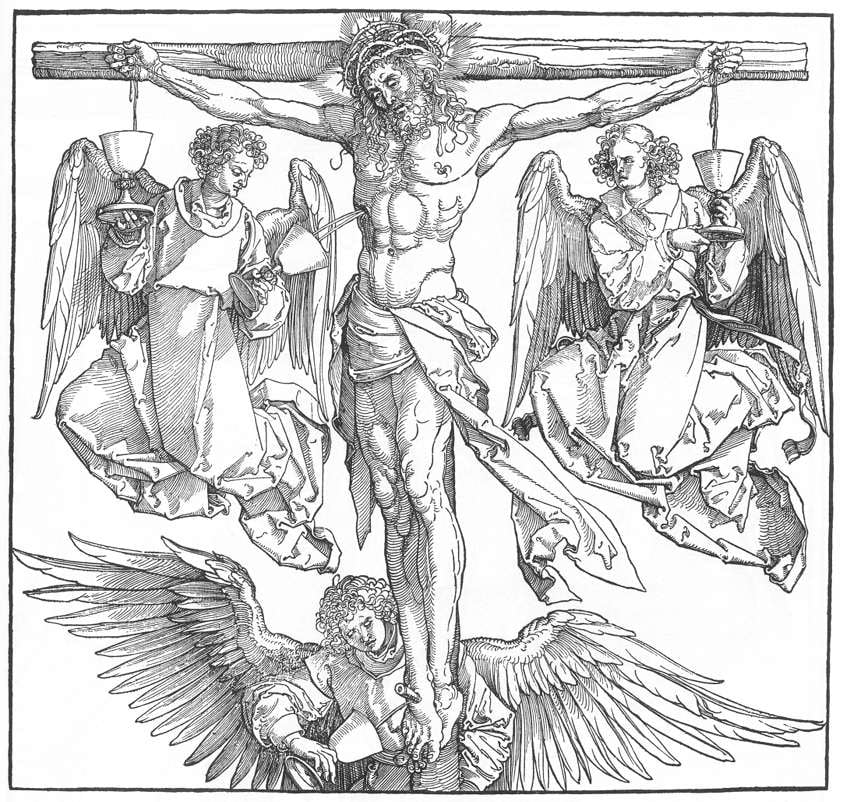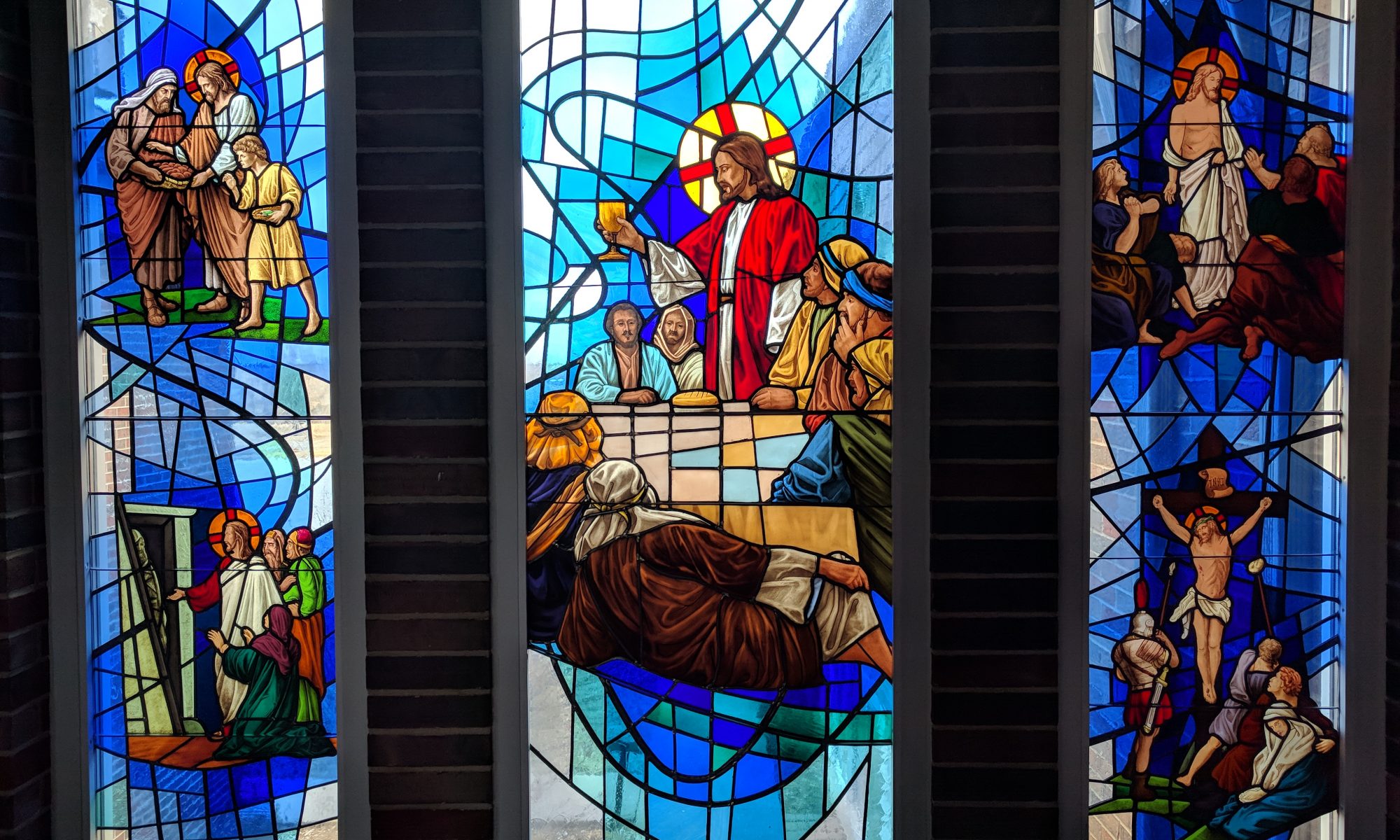
Lessons: Psalm 41, Exodus 12:1-14, 1 Corinthians 11:23-32, John 13:1-30
Hymns: LSB 596, 617, 445, 627
Grace, mercy, and peace to you from God our Father and our Lord and Savior, Jesus Christ. Amen.
Throughout our midweek services this Lenten season, we have been praying Psalm 41 and hearing sermons based on this psalm of David. King David was inspired by God the Holy Spirit to write this psalm. If it weren’t for tonight’s Gospel reading, it could be a bit more difficult to understand the purpose of the psalm. Some have tried to make this psalm primarily about David and his son Absolom rising up against him. While it is possible that was the occasion for writing the psalm, we know the true purpose of the psalm as Jesus interprets it. The psalm was written to prophetically state the words of Jesus as He endures His Passion.
The psalm began with Jesus speaking of how blessed Christians are when they consider Him, for the Lord delivers them, protects them, and sustains them on their sickbed (Psalm 41:1-3).
Then the psalm speaks of what Jesus willingly did for us and for our salvation. The Lord laid on Jesus the iniquity of us all (Isaiah 53:6). He was held accountable for our sin. Jesus claimed our sin as His own so that He could pay for our sin (Psalm 41:4).
Our Lord’s enemies, however, were asking, “When will He die, and when will His name perish?” (Psalm 41:5). He would soon die but His name will never perish.
Many were speaking empty words as they derided the Word made flesh and imagined the worst for Him, even though He was taking away the sin of the world as He suffered on the cross. They thought He would die and never rise. (Psalm 41:6-8).
Then Jesus said in this psalm, “Even My close friend in whom I trusted, who ate My bread, has lifted his heel against Me” (Psalm 41:9). As Jesus speaks of the things that are happening to Him, He acknowledges that one of the Twelve has attacked Him, lifting his heel against Him.
This language recalls the first prophecy recorded in the Bible concerning the coming of our Savior. After Adam and Eve sinned, God said to the serpent, “I will put enmity between you and the woman, and between your offspring and her Offspring; He shall bruise your head, and you shall bruise His heel” (Genesis 3:15). What this prophecy is saying is that a Virgin will conceive and bear a Son who will defeat the Devil (He will bruise or crush Satan’s head). The Son will be injured (Satan will bruise His heel) but Jesus will not be defeated.
Ever since God first spoke this prophecy of the Messiah, Old Testament Christians looked forward to the fulfillment of those words. In fact, Eve thought she gave birth to the Messiah when giving birth to Cain, for she said, “I have gotten a man, the Lord” (Genesis 4:1).
David echoed the first prophecy of Jesus, saying “My close friend has lifted his heel against Me.” What this means is that a close friend of Jesus would deliver a most painful blow against Jesus. If you had to endure either the punch of a closed fist or the kick of a heel, which would you choose? The heel is explosive, involving the powerful muscles of the leg. The damage caused by our Lord’s close friend would be severe.
Jesus quotes this psalm on Maundy Thursday when speaking of Judas as we heard in our reading from John 13:1-30. Recall what Jesus said in our Gospel, “I am not speaking of all of you; I know whom I have chosen. But the Scripture will be fulfilled, ‘He who ate my bread has lifted his heel against me’” (John 13:18). Then our reading continued: “After saying these things, Jesus was troubled in his spirit, and testified, ‘Truly, truly, I say to you, one of you will betray me.’ The disciples looked at one another, uncertain of whom he spoke. [John] was reclining at table at Jesus’ side, so Simon Peter motioned to him to ask Jesus of whom he was speaking. [John], leaning back against Jesus, said to him, ‘Lord, who is it?’ Jesus answered, ‘It is he to whom I will give this morsel of bread when I have dipped it.’ So when he had dipped the morsel, he gave it to Judas, the son of Simon Iscariot. Then after he had taken the morsel, Satan entered into him. Jesus said to him, ‘What you are going to do, do quickly’” (John 13:21-27).
Satan was already tempting Judas. He had already agreed to betray Jesus for thirty pieces of silver. Judas had even received the Lord’s Supper. But now Satan entered Judas and Judas left to go get the band of soldiers and some officers from the chief priests and Pharisees who would go with him to the Garden of Gethsemane with lanterns and torches and weapons for the purpose of arresting Jesus and preparing Him for trial (John 18:3).
Of course, all of this was for a reason. Despite the sinful actions of mankind, God was using these events so that Jesus could render complete and full satisfaction for the sins of the world. He would die vicariously (that is, in our place) as the ransom payment for our sin. He goes forth willingly as the Lamb of God to take away the sin of the world.
On this night, Christ our Lord establishes His last will and testament. A testament is secured by the death of the testator (Hebrews 9:16-17). As Jesus celebrates the Passover with His disciples, He takes bread, blesses it, and gives them His Body. He takes the cup of wine, blesses it, and gives them His Blood. He instituted the Lord’s Supper, a feast for Christians to celebrate until Jesus returns. We can be certain that we are eating the Body and drinking the Blood of Jesus because He said so and what He instituted is now sealed up as true to the end of time our Lord’s death. That is, this testament is secured by the death of Christ. In Holy Communion, Jesus gives us His Body and His Blood so that we are united to Him and He is united to us. In this Sacrament we are communing with one another, expressing our unity of faith with one another. God the Holy Spirit is working to strengthen our faith so that we heartily trust in Christ and withstand temptation. And the forgiveness of sins Jesus earned on the cross is being delivered to us. All of this takes place as we receive the Sacrament. It is pure blessing for the Christian. It is pure joy to receive it. What in this life could possibly take priority over coming into God’s house to receive this most incredible blessing?
Even the prophecy of Judas shows us how intimate and special this Sacrament is. Jesus said, “Even My close friend in whom I trusted, who ate My bread, has lifted his heel against Me” (Psalm 41:9). My close friend ate My bread. This phrase carries a level of intimacy. If we are invited to break bread together, it is a meal shared by good friends for a good and special time. Jesus had that with Judas. Yet Judas was filled with Satan’s rage and lies and raised his heel against Jesus.
Such is the way of life in this fallen world. We will have close friends and even relatives who will betray us. We may share personal secrets with a trusted friend, only to learn that friend is an unbridled gossip. Couples enter holy matrimony and share the marriage bed which is extremely vulnerable and private (but also very good), only to have them split up and chase after others.
Despite the hurt we may have endured through various sins, Jesus still cleanses and purifies us. He imparts His own holiness to us as we receive the Lord’s Supper. He cleanses us of the filth others have inflicted upon us, even as He cleanses us of our own sin through the Sacrament.
And so, we eat His bread, participating in a most sacred meal. We are joined to Christ and He is joined to us. He is our Friend who laid down His life for us, that we may obtain the gift of everlasting life with Him (John 15:12-14, John 3:16-17). Amen.
The peace of God which passes all understanding keep your hearts and minds in Christ Jesus to life everlasting. Amen

